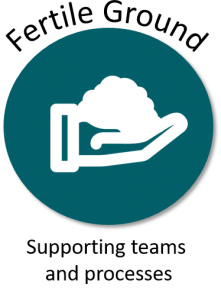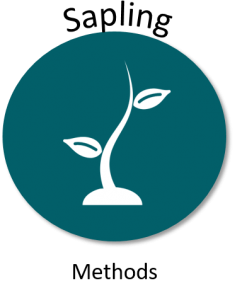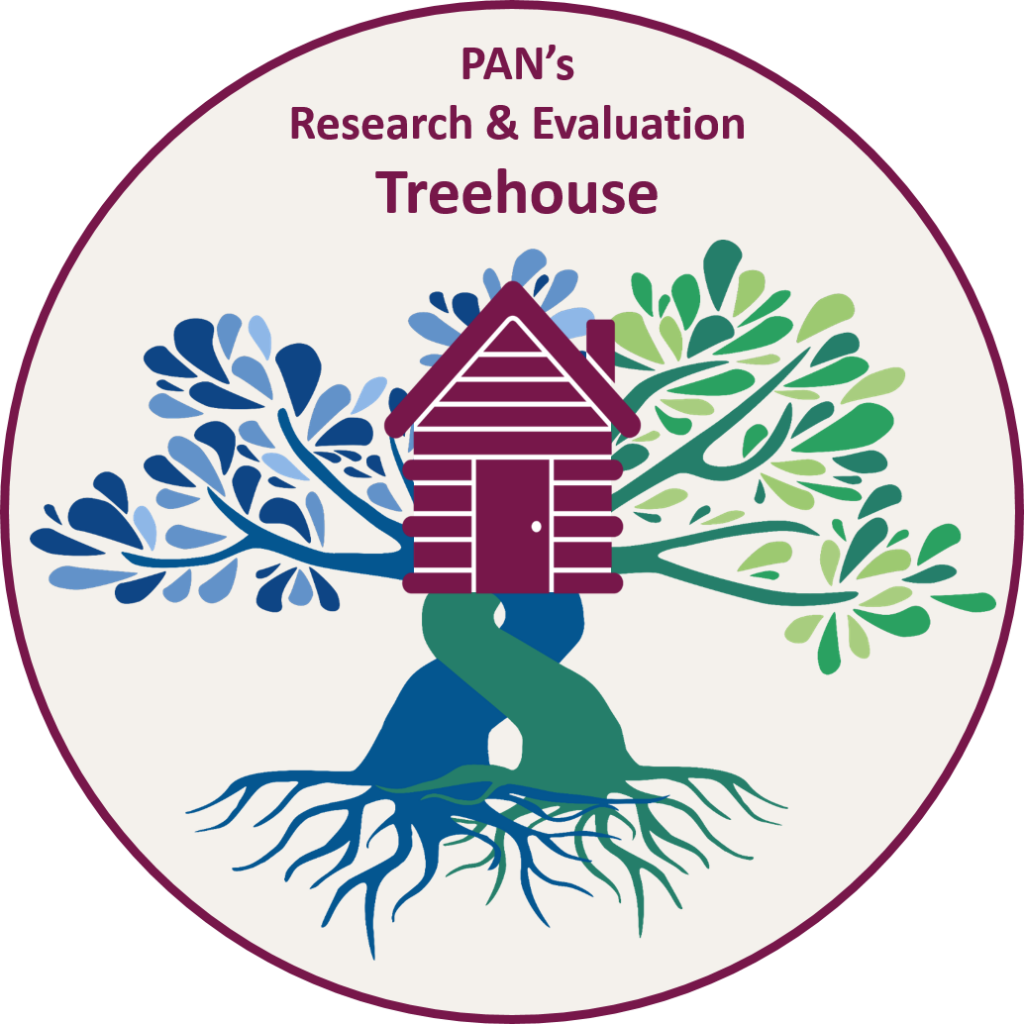While research and evaluation are different, they share many similarities, especially when thinking about participatory methods. We think of research and evaluation like two different trees with different origins, intertwined in methods and analysis, that separate again in what they can tell you and how their information is shared.
PAN’s Research and Evaluation department has put together a Treehouse to share resources that can be helpful for both evaluation and research. Building on the tree metaphor – the Treehouse sits on the limbs between both the Research and the Evaluation Tree and provides a space for us to come together to learn and build our capacity in both of these areas. We will highlight new research and evaluation resources every six months that cover five important phases of work:
- Fertile Ground: Supporting teams and processes
- Seeds: Ideas and approaches
- Sprouts: Planning
- Sapling: Methods
- Mature Tree: Analysis and knowledge sharing
Read more about how PAN’s Treehouse came to be!

 |
Peer leadership in research and evaluation: A collection of videos and tools highlighting how important the meaningful engagement of, and leadership by, people with lived experience is in research and evaluation.
Negotiating information sharing in community based research: A blog post highlighting how the Making it Work Research team navigates different priorities like academic publications, ownership of data and transparency. Making Allyship Work: Allyship Perspectives in a Community-Based Research Study: Read about our submission to the Journal of Indigenous HIV Research and how allyship shows up in the Making it Work Research Study. The Basics of Community-Based Research: Part 1: The first in a series of “CBR Basics”, this blog post shares some of the ‘what’ and ‘why’ about community based research. The Basics of Community Based Research, Part 2.1: Community-based-research often addresses disparity, inequality, and inequity, and this post lays out definitions of each. The Basics of Community-Based Research: Part 2.2. This resource shares four aims that further paint a picture of how community-based research can serve the purpose of helping communities drive change. |
 |
Participatory Evaluation Whiteboard Video: A short video describing participatory evaluation and sharing tips and tools. Manitoba Community Event-Based STBBI Testing Toolkit: A toolkit developed by the Manitoba Harm Reduction Network to increase access to STBBI testing in community. Researcher’s Handbook: This handbook is built on the experiences of Peer Researchers and is a guide for research teams to meaningfully engage with people with lived experience. It includes topics like recruitment, onboarding, and supporting Peer Researchers. Balancing Rigor and Relevance in literature review: Development of Guiding Principles and Practices for People with Lived and Living Experience in Community Based Organizations: Literature reviews are often an important step at the beginning of a project, but there are challenges that make them responsive to community. This blog post describes a unique approach that PHSA’s Collective Impact Network took to a literature review. Reciprocity in Research, Part 1 – Supporting Community Experts Participating in the SHAWNA Project. The main objective of the SHAWNA Project is to understand the factors that shape access to HIV care and sexual and reproductive health among women living with HIV. The SHAWNA Project includes quantitative (surveys) and qualitative (narrative interviews, focus groups, arts-based methods) approaches. The Value of Using a Peer Evaluation Approach. An in-depth look at the Peer Evaluation Approach using the example of the Positive Leadership Development Institute (PLDI) and the Culturally Safer HIV Leadership Training Project. |
 |
Strong Connections: Community and Researchers Working Together: Here we highlight a series of resources that can help both organizations and researchers think through what to do and how to work together when working together on research.
From Theory to Practice: The Challenges and Opportunities of Doing Participatory Evaluation: This blog post details PAN’s experience with participatory evaluation and shares recommendations and resources to help teams understand how to engage in participatory evaluation. Qualitative Coding Resources: Visit this page for a host of resources about qualitative data analysis, including videos about qualitative coding, and links to helpful resources. Sampling for program evaluation using surveys: practical tips and resources. One of the most common questions an evaluator can encounter is: “Who and how many people should I survey to evaluate our program effectively?” This answer, while seemingly straightforward, involves a clear understanding of their program evaluation goals, and the methodology applied to achieve those goals. Planning Ahead: GetCheckedOnline turns 10! An update from BC’s digital testing service for STBBIs that shares exciting information about outcomes of the project and next steps for the program. This post also shares resources that support the use of evidence in public health practices and policies. |
 |
Treehouse Implementation Science Guide: This guide is a primer to implementation science. It will help you understand the basics and get your implementation science research going.
Decolonizing Methodologies: A Conversation: In this series of videos Sherri Pooyak of the AHA Centre shares her wisdom about decolonizing methodologies and doing research in good ways with Indigenous communities. Indigenizing Survey Methods: This blog post shares learnings from the Making it Work Research Team and their work to create an Indigenous Realist Evaluation Survey to understand why, when, how, and for whom community based services work best. Decolonizing Data Analysis Methods A previous Treehouse piece explored Indigenizing Survey Methods. We continue the discussion with this resource which focuses learnings from Indigenizing data analysis in the Making it Work project. Visually Understanding Program Evaluation. This resource explores different evaluation methods and when they might be helpful during different kinds of projects. By providing examples and a visual tool, this post hopes to help the reader determine which types of evaluation are most useful at different stages of program development and improvement. |
 |
Equitable online access for information sharing: These resources explore a community-centred approach to increasing digital access in your community and can inspire us to ensure our move to digital research and knowledge transfer/translation and exchange is as equitable and inclusive as possible. Team Discussion Tool: Supporting Teams to Build a Common Understanding about Information Sharing and Data Stewardship for Evaluation Projects: A PAN-developed discussion framework that can be helpful for teams to talk about and establish a clear understanding of each other’s needs when working on evaluation projects. PAN’s HIV Housing Toolkit: As part of the Positive Living Positive Homes Project, PAN created an online Housing Toolkit as a resource for people living with HIV. There are many helpful resources housed within the toolkit, and this blogpost helps highlight some of the most used. Reciprocity In Research, Part 2 – Knowledge sharing and exchange in the SHAWNA Project. As part of SHAWNA’s commitment to reciprocity in research, several of the main ways that we try to connect what we do with community experts include: (1) collecting information on community expert preferences on receiving information about the study; (2) producing a newsletter two times per year; (3) summarizing research findings into infographics and plain language summaries; and (4) utilizing arts-based research methods. Making Knowledge Translation Work. After years of researching what makes community services ‘work’, the Making it Work study is finding ways to share out our learnings. This resource explores how different ways of sharing research findings can help engage different audiences. We share examples and resources that can help other projects. |
Questions? Feedback? Resources to share? Get in touch!
Joanna Mendell, Director of Research and Evaluation, [email protected]

